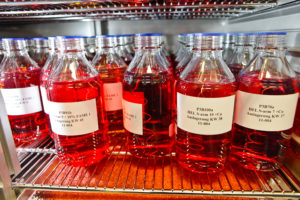Fuels
… in the Domestic Heating Market

Fuels with different biogenic shares are being tested in long-term tests for their interdependencies with materials used in the heating equipment. Photo: OWI
Climate protection and the preservation of fuel supply security are two decisive driving forces for the developments in the domestic heating market. On the one hand the activities lead to a constant optimisation and development of the heating technology and, on the other hand, to an increasing blending with regenerative fuels. At the moment, heating oils with up to 10 % V/V bio components (FAME, fatty acid methyl ester) can be purchased in the fuel market. Higher permitted FAME contents are currently tested regarding the compatibility with individual components in the heating system.
At OWI, numerous individual case analyses and basic investigations regarding the impact of various admixtures of regenerative fuels are performed. On the one hand, the effects on the heating technology are being observed from individual components to the complete heating system. On the other hand, the changes of the physical-chemical properties of fuels that are caused by the admixture of biogenic content are investigated. The properties can vary significantly as different vegetable oils, e.g. palm oil, rapeseed oil, soya oil or used cooking oil are used as possible raw materials for the production of FAME. Further, regenerative or alternative fuels that have to be investigated are Biomass-to-Liquid (BtL) and synthetic fuels, such as Gas-to-Liquid (GtL). The hydration of vegetable oils, e.g. HVO, is further developed. The possibility for using BtL, GtL or even HVO in the domestic heating market is investigated. OWI works in cooperation with manufacturers of heating systems, fuels and additives as well as with the mineral oil industry. In the heating technology, components, such as
- heating oil tanks,
- fuel pumps,
- filters,
- nozzles and
- burners
are investigated. These are standard components so that the effects of various fuels and new additives on the reliability of existing oil burning installations can be recognised within a relatively short time. Investigations regard, for instance, the potential
- formation of deposits on components due to the combustion of regenerative fuels,
- interdependencies between fuels and materials, such as plastics or metals,
- changes of exhaust gas emissions,
- boiler efficiencies,
- storage stability (aging processes) and
- possible microbiological processes in fuels.
For these investigations, OWI develops appropriate analysis methods that are carried out at specifically designed and constructed test-rigs. OWI aims at simulating the processes and their mechanisms which take place in heating systems over several years in shorter time periods of about 1.000 hours as realistically as possible. Moreover, OWI wants to analyse the reasons for failures of heating devices. Additionally, the development of laboratory analysis methods for fuels which generates assessments about the character of fuels within a few hours. This results in recommendations by OWI, for instance regarding
- the optimisation of fuels by means of appropriate additivation,
- the use of other materials,
- the change of constructive principles of components or
- the change of operating parameters of components or complete systems.
Parts of these investigations are the basis for the recommendations that heating system producers give their clients regarding the appropriate fuels for their systems.
